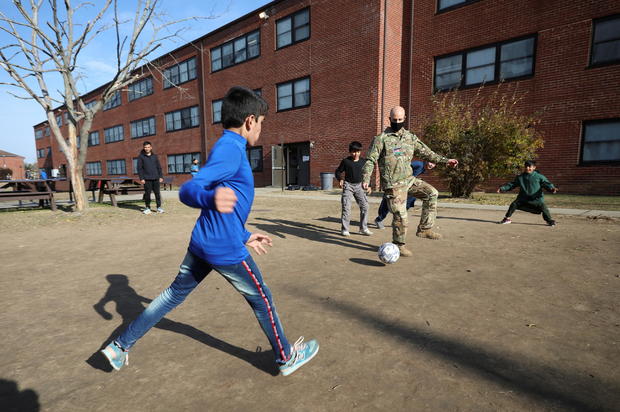Seven states have received more than half of the 31,611 Afghan evacuees who have left U.S. military sites in recent weeks to start new lives in America, according to internal government data obtained by CBS News. As of December 7, Texas, California, Virginia, New York, Washington, North Carolina and Arizona had received 16,303 Afghans who were evacuated from Afghanistan following the Taliban's rapid takeover of their homeland, the statistics show. In contrast, Hawaii, South Dakota, Mississippi, Alabama, Montana, Delaware and North Dakota had collectively resettled fewer than 90 evacuated Afghans as of last week. West Virginia and Wyoming are not expected to receive any evacuees. The State Department figures, which have not been previously reported, show that approximately 80% of the Afghan evacuees relocated from U.S. military bases have settled down in 18 states with the help of non-profit resettlement groups. The metropolitan areas receiving the most evacuees are Houston, San Diego, Atlanta, Sacramento, San Antonio, Dallas, Chicago and Glendale, according to the data. Beyond the seven states with the largest number of Afghan arrivals, Missouri, Pennsylvania, Ohio, Oklahoma, Georgia, Colorado, Maryland, Florida, Michigan, Illinois and Massachusetts have each received more than 700 evacuees. Former Delaware Governor Jack Markell, the top White House official coordinating the Afghan resettlement effort, said the evacuees have received a warm welcome in communities with different political leanings, including Republican-led states. "It has been truly remarkable to travel across the country and see first-hand that red and blue really make no difference," Markell told CBS News Thursday. "When we listen to our veterans, who have been so clear about our obligation to provide a safe and dignified welcome to our allies, that's something the vast majority of Americans are responding to positively." Since the summer, the Biden administration has brought 75,000 Afghans to the U.S. as part of a massive operation to resettle civilians who could be harmed in Taliban-controlled Afghanistan, including those who aided American forces. According to Department of Homeland Security (DHS) data, 43,000 Afghans have arrived in their new U.S. communities, including those who did not go to the domestic military bases or who left the sites on their own accord. As of December 7, more than 27,000 Afghans remained at the seven military sites where evacuees have been undergoing immigration processing and vaccination against contagious diseases like COVID-19, the State Department figures indicate. Texas, California, Maryland, Florida, Washington, Virginia and Massachusetts are expected to receive approximately half of the evacuated Afghans who remain at the military bases, according to internal State Department projections, which could change. Overall, roughly a third of all evacuees are expected to live in Texas, California and Virginia, three states with large Afghan diaspora communities. With the goal of resettling all Afghans by February 2022, the Biden administration has taken several steps to accelerate the operation, including launching a program that allows groups of private citizens to sponsor evacuee families and limiting admissions of other refugees. But the effort has faced several obstacles, including a resettlement infrastructure crippled by the coronavirus pandemic and the Trump administration's decision to slash refugee admissions to record lows. A shortage of affordable housing, particularly in areas where many evacuees have family members, has also hindered the work of the nonprofit resettlement groups that partner with the government to integrate refugees into U.S. communities. "Housing has been the biggest challenge for us," said Jenny Yang, vice president of advocacy at World Relief, one of the nine national resettlement groups. "In certain cities that are impacted, like Sacramento, there is no affordable housing available." Because of the housing crisis, Yang said her organization has placed some Afghan evacuees in hotel rooms while caseworkers look for permanent options. The Biden administration has also been encouraging evacuees to settle in communities where they may not have family ties, but where housing and jobs are available. "We very much want to set our allies from Afghanistan up for long-term success," said Markell, the White House coordinator. "That means we want them to be in places where there is stable housing, where they can be quickly connected to employment, where the children will be welcomed in schools that are ready to accommodate them." Evacuees also face uncertainty over their legal status in the U.S. Most Afghans have been admitted into the U.S. under a humanitarian policy known as parole, which authorizes their entry but does not provide them a pathway to permanent residency. According to DHS estimates, two out of every five Afghans brought to the U.S. qualify for special immigrant visas because they or their family members assisted the American war effort. Recipients of these visas automatically become U.S. permanent residents. Evacuees who do not qualify for the special visas, including journalists and activists, could seek asylum to try to gain permanent status. But the U.S. asylum program is already reviewing 412,000 pending applications, government figures show. "The ability to have legal support is really going to be critical," Yang noted, highlighting the complex U.S. asylum process.
Tags:
News
